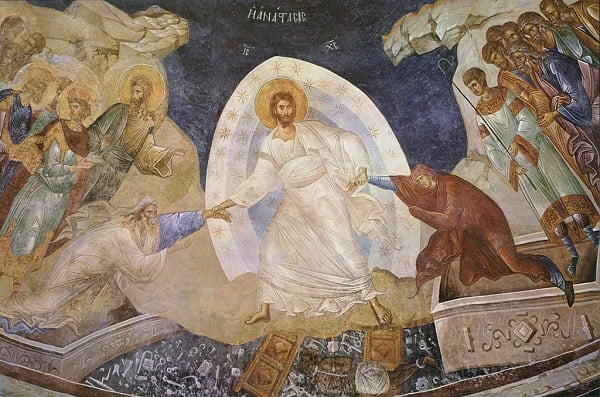- Home
- About us
- Students
- Courses
- Research
- Library
- News & Events
- Gallery
- Contact
- Our Blog
Latest News

The Resurrection of Christ and The Victory of Life
Christ is Risen! Χριστός Ἀνέστη! Truly He is Risen! Ἀληθῶς Ἀνέστη!

by Assoc. Professor Philip Kariatlis (Sub-Dean)
In a profoundly simple manner, the concise greeting, “Christ is Risen! Truly He is Risen!” contains within it the entire message of the Christian faith. The Apostle Paul of course had insightfully declared this when he wrote: “if Christ has not been raised, then our proclamation has been in vain and your faith has been in vain [εἰ δὲ Χριστὸς οὐκ ἐγήγερται, κενὸν ἄρα [καὶ] τὸ κήρυγμα ἡμῶν, κενὴ καὶ ἡ πίστις ὑμῶν·]” (1Cor 15: 14). Not only is this joy-filled Feast of all Feasts, as it is known in the Orthodox Church, a celebration of Christ’s “trampling down death by death” and rising again to live and reign eternally, but it is also the basis of hope and joy for the entire cosmos, in that we too are now gifted with everlasting life and immortality.
Indeed, so central is this Paschal event within the Orthodox Christian tradition, that the entire week following Easter, is known as ‘Bright Week’ or ‘Renewal Week’ and is precisely understood to be one day, one continuous Paschal celebration. It follows, therefore, that as Christians we are called to give witness, together, to the joy of the Resurrection, “so that the world will believe” (Jn 17:21). Indeed, in a world dominated by time and therefore by death, there is no greater message that can be offered to the world than that of a life that will now have no end. In a homily by St John Chrysostom, read out on the Eastern night Service in all Orthodox Churches, we are reminded that: “no one need to fear death; the Saviour’s death has freed us from it.”
In this festive atmosphere of Paschal joy, let us be reminded, as Christians, to continue to proclaim our steadfast faith that the power of death has been utterly destroyed; and that the gift of life, in all its fulness, now reigns victorious. Indeed, anything different runs the risk of turning Christianity into a philosophy or a moral teaching but not the ‘good news’ of Christ’s victory over death, and by extension our entrance into eternity. And what is more, is that this joyous and life-giving message of Pascha is one extended not only to all Christian faithful around the world, but more broadly, the entire world, to all of creation. All are invited to enjoy the bright festival and to participate in the gifts so abundantly enunciated by this universal message of life and light; in the gifts of joyfulness and jubilation; of hope and reconciliation. As a matter of fact, all are invited to come and receive the ‘light-filled’ gift of life so generously bestowed by Christ on Easter morning.
More importantly, this gift of life, opened up before us by our Risen Lord, is not life as we customarily know it in its biological dimensions. Rather, it is one which sets us free from the fear of death; a life which far exceeds our time here on earth; one which promises to extend beyond the grave and into the sweet fragrance of Christ’s eternal kingdom; namely, a life beyond death. During this festive season of the Resurrection, we are reminded that our Saviour destroys the sting of death, by enduring death, and, in so doing, becomes, through his resurrection, as St Paul tells us, “the first fruits of all those who have died” (1Cor 15:20).
In this way, the feast of Pascha is a most compelling reminder that heaven and earth have been brought into communion. In this universal message of Pascha, we behold before us an intimate and lasting unity between two radically different realities: namely, the created world and our uncreated God. Throughout this entire week, in all Orthodox Churches, the Royal Doors remain fully open; this unblocked view of the altar represents the open ‘door’ of Christ’s empty tomb as well as the “curtain of the temple, [which] was torn in two, from top to bottom” (Mt 27:51), as we read in the Gospels.
On Pascha day, the gates of Paradise open up before us and the light of Heaven permeates the entire universe, sanctifying all that comes into its path. It is for this reason that the Orthodox Church, in one of her hymns on Easter night, proclaims, “now all things are filled with light, heaven and earth and all things beneath the earth.” The light is none other than the presence of the resurrected Christ amongst us, Christ “the true light which enlightens everyone” (Jn 1:9), namely, the unfading joy of our eternity.
For us it remains, and indeed, as we say in one of the hymns of the Resurrection Service, “[to] go forth with candles and lamps to be with Christ who emerged from the sepulchre like the Bridegroom; and with festive ranks of Angels… [to] celebrate God’s holy Pascha that saves us all”. Indeed, anchoring ourselves around Christ together, let us, more than ever, embrace this unfading light of Christ, with all our hearts and with all our being. Let us rejoice in the Light of the Resurrection and share the radiant Paschal joy to all those around us through our witness. In so doing we will know that His is a radiant and resplendent Light which will radically transform our fragile existence, raising us up into life everlasting; and indeed, bringing us all together as one.
It is only fitting to end with the following resurrection hymn which reminds us that amongst life’s many anxieties, the gift of Christ’s unfading light now enters human history providing serenity and solace, as it reveals to us the certainty that Someone loves us and has pledged to remain with us for all time, pointing the way to life and love in all abundance, namely to eternity:
“O divine, and beloved, and sweetest utterance of Yours! For you really and truly pledged that You will be with us unto the end of the age, O Christ. And we, the faithful, clinging to Your promise, our anchor and hope, rejoice!”
῍Ωθείας, ὢφίλης, ὢ γλυκυτάτης σου φωνῆς· μεθ᾽ἡμῶν ἀψευδῶς γάρ, ἐπηγγείλω ἔσεσθαι, μέχρι τερμάτων αἰῶνος Χριστε· ἣν οἱ πιστοί, ἄγκυραν ἐλπίδος, κατέχοντες ἀγαλλόμεθα.
Christ is Risen! Χριστός Ἀνέστη!



.png)